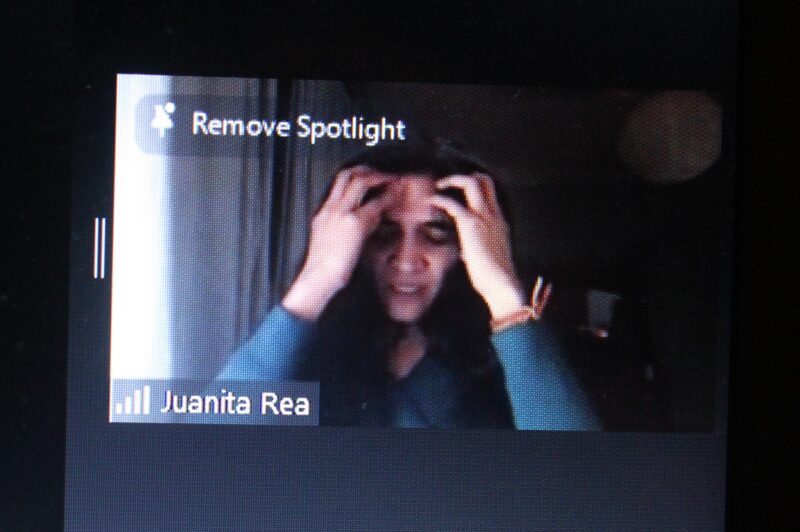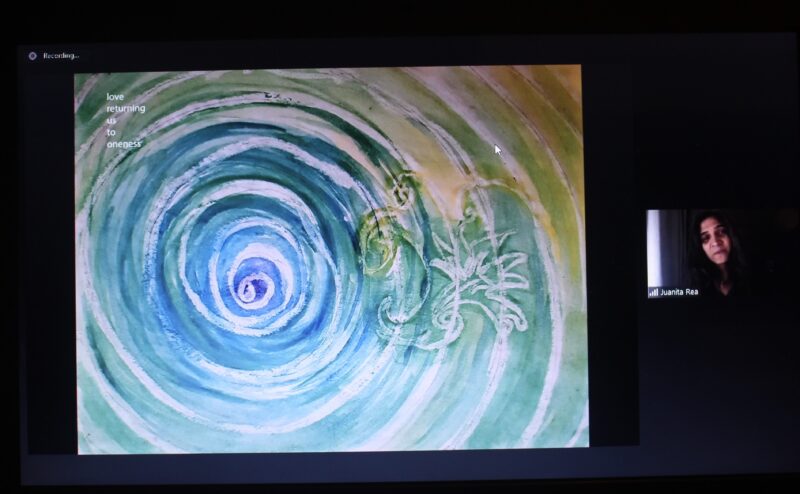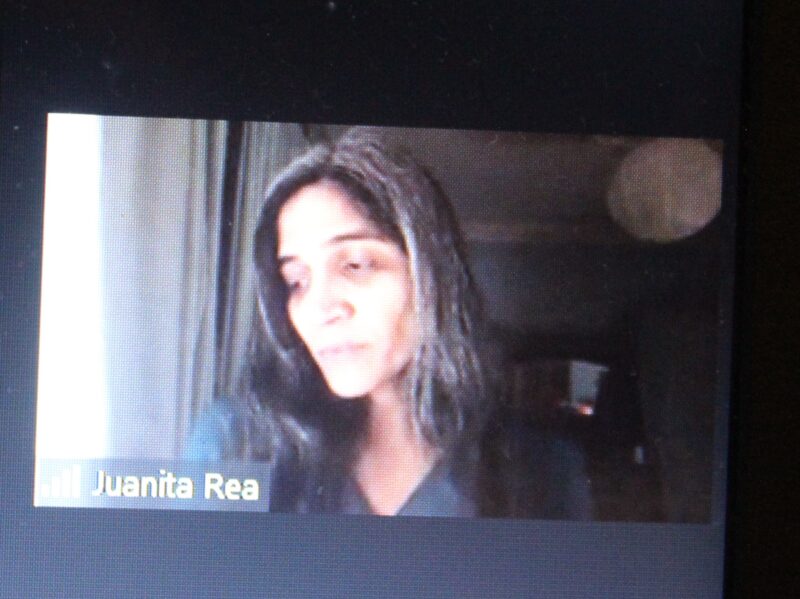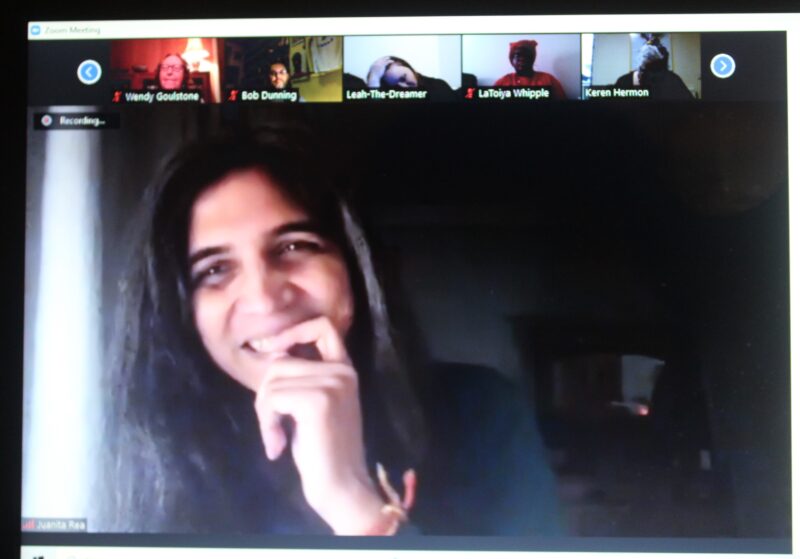INTERVIEW: FIRE & DUST MEETS JUANITA REA
Juanita Rea is a South African artist and activist living in Belfast. She works within a range of creative arts to address gender-based violence and other injustices, alongside facilitating well-being and community arts programmes, especially for vulnerable people and children. Juanita began sharing her art last year and was a joint runner up at the StAnza Slam (Scotland). Her poetry has been published in magazines such as Northern Ireland Mental Health Arts Festival, Steel Jackdaw (Stroud) and Writeresque (Nottinghamshire), and she has performed poetry and music at the Duke Special Gramophone Club in Belfast. She has received a Global Talent endorsement from Arts Council England and an Arts Council Northern Ireland award to work on her upcoming debut album of spoken word and songs. Juanita also founded non-profit arts organisation and Future Screens NI grant awardee eduSOIL, to provide intercultural community arts programmes for underrepresented global majority groups to access mental health support through creative, contemplative and community-based practices.
Juanita was our second virtual headliner of 2022 at the Fire & Dust poetry event on 10th February. We caught up with her after the gig, to ask a few questions…
HCE: Tell us a little about your background and journey as a writer so far. What inspired you to start creating poetry?
JR: I’ve been a writer since childhood but only recently recognised the stuff I had hidden away in notebooks were poems that were worth sharing. Pen and paper helped me process the pain and hurt I felt all the while I was unable to say certain truths out loud. As a survivor of childhood sexual trauma and domestic violence, within a South African Indian community where talking and addressing such issues was taboo, writing was a way of breathing through difficulty.
HCE: How did you get into performing your work? Your delivery style is passionate and energetic – did you have confidence from the start or was this something you had to develop?
JR: I joined my first online poetry open mic in January 2021 after being encouraged by a poet friend. Zoom events gave me the safety I needed to stand in my bedroom and take my first tentative steps with sharing my poetry. I wouldn’t call myself a performer, and I certainly don’t feel confident when sharing. I just reached a point in my life of needing to be honest. The passion and energy are perhaps just the outpouring of raw feelings that can no longer be denied.

HCE: Would you say there are themes or motifs that you tend to gravitate to in your work?
JR: I write about topics that I spent most of my life being unable to speak about – childhood sexual trauma, domestic violence and mental disorders. Having lived in South Africa, South Korea, the UK, the Philippines, India and Sudan and worked around SE Asia and southern Africa, I also write about the suffering and struggles of others, particularly underrepresented and underserved communities. Nature is another theme of my work and I experience immense connection and calm when immersed in a forest, ocean or even in the rain.
HCE: Who is your work aimed at – do you have an ideal audience in mind when you’re putting a poem together, and what message(s) do you hope they take away from your performance?
JR: I share my work to de-stigmatise trauma and my hope is that others who have had similar experiences find ways to navigate their own hurts and healing. When writing about racism, oppression, war and the struggles of underserved people, my aim is to raise awareness about issues that we all as human beings have a responsibility towards. My nature poetry are love letters to Earth and in sharing them, I invite others to fall in love with grass and clouds and sunlight. There is immense suffering in the world as well as extraordinary beauty. I write about the dark and the light because we are both and in being both, we can perhaps be honest, healthy and whole.
HCE: You made use of ‘screen share’ for your Fire & Dust headline set, to show us some accompanying film footage. Are these official poetry films, or purely for use in live performances? Did you record the videos yourself or were they collaborations with another artist?
JR: The films made between 2012 and 2015 were edited by my dear friend, Anirudh Ashok, who put together my video footage, poetry and audio. When they were made, live performance wasn’t on my radar as I was working as a schoolteacher and social entrepreneur at that time, not as an artist. After launching my career as an artist last year, I recognised that I could incorporate the older pieces during live performances and have also created poetry films by myself – merging and editing original video footage, recorded spoken word and sometimes musical elements.

HCE: What, in your opinion, are the essential ingredients for a well-written poem?
JR: Given that I have no formal training as a writer, my answer to this question is based on my experience of responses I have received to some pieces. I think that a well written poem is an interweaving of truth, story, rhythm and invitation – an invitation to a place, person or experience in such a way that the reader or listener connects with the piece and through this connection, connects with themselves.
HCE: In what ways do you think growing up in South Africa has shaped your poetry and experiences? And do you consider your current home (Belfast) a good place to be a writer?
JR: As mentioned previously, writing was a way of breathing through the shame, hurt and anguish I felt as a survivor of childhood sexual trauma and domestic violence within a South African Indian community where talking and addressing such issues was taboo. Not having an outlet in SA for my poetry led me to write and keep my work away for years. I found a space in Belfast in 2019 that welcomed my poetry and other artistic expression and gave me the support and confidence I have needed to put my work into the world. Belfast is a creative cocoon. There is both a thriving, welcoming arts community as well as warm and welcoming responses to artists at all stages of their careers. Belfast is a small city, so there is a sense of closeness and lots of opportunities for individual development and collaboration.
HCE: What type of poetry do you seek out for personal enjoyment? As a reader/listener, when you engage with a poet’s work, what are you hoping to get out of it?
JR: As a university student, I walked around with a copy of Kahlil Gibran’s ‘The Prophet’ in my bag. It was there even when homework assignments were not! I read it to myself and read it to friends. I had copies of the book in every country I have lived and read and reread it, each time experiencing something new based on what was happening in my life and the community I was in.
As a reader, I open pages of poetry to travel to moments of hope, honesty, hurt and humanity. I read and re-read pieces that break my heart open to my own truths. As a listener, I am drawn to similar work. I want to connect with human beings, so it matters more to me that the words are spoken with meaning. I am less concerned with craft yet am not unaware of it. However, a piece that is honest touches me more than a piece that is well-honed.
HCE: What’s next on the horizon for you? Are you already working on projects/booked for upcoming performances?
JR: I am working on an upcoming collection of poetry and portraits with Red Balcony Press, an imprint of Black Eyes Publishing. I am also working on my debut album of spoken word and songs with the support of an Arts Council Northern Ireland award. My long-term goal is developing an autobiographical multi-disciplinary piece that weaves together poetry, spoken word, visual art and music into a hybrid piece with live and recorded performance that de-stigmitises childhood sexual trauma and mental disorders with the aim of addressing gender-based violence.

HCE: Some of your poetry deals with your own life experiences in a raw and honest way. Is this an emotionally draining thing to do? What is the top piece of advice you would give other poets for tackling heavy/personal topics?
JR: It is both emotionally draining and exhilarating. The writing process is challenging and I often write just to write, without thinking about form, structure or the audience who may read it or hear it. I write it, to feel it, and to let the feelings be named and for the truths to be told. Then I often find myself forgetting about things I’ve written and rediscover the pieces whenever I am beginning to consider sharing them. Then I look at the pieces, with the audience in mind – thinking about the journey they may go on when reading or hearing the piece. My advice: be compassionate to yourself and others while being honest, however hard this feels, while trusting that the difficulty does ease.
HCE: What’s the best way for people to keep connected with you and your work, or contact you for bookings?
Instagram Facebook Website YouTube

